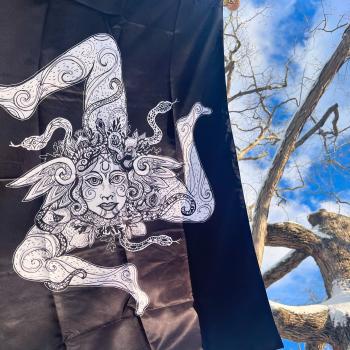Well, if the rest of us are hajjis, we don't all look like hajjis. Only one other woman has on white: an African sister, whose partner does not wear the two cloths. In fact, several Africans were in their native dress. Okay, so maybe they will change on the plane. Well, about four and a half hours into the flight, they announce over the speaker that we will be passing over the mikat in about five minutes. How cool is that? Well, I thought it was cool, and that some of these guys would be rushing to the toilet. But no, not one single soul changed outwardly.
Disembarking from the plane onto waiting buses, we are soon off to the terminal for customs and immigration processing. On the way, we pass a busload of Indonesians from another flight. Everyone on that bus is in white. Everyone looks like they are going where I am going. I get the bus full of eclectic folks with their dress variants. I remember being an honorary Indonesian at an international conference because, well, there were not enough Muslims from America to make up a group, and because of my Indonesian residency, my friends to let me join their group. So already I am comparing. Why can't I be with a group that actively prepares for the hajj for almost a year? They have to attend classes, memorize the du'as and they even color-coordinate their luggage. A real "group" experience.
Then, when we hit the processing station or pavilion for hajjis, we enter into a multi-layered system of regulations and stipulations—all with the air of absolute officialdom, but also so much chaos it would send a first-timer through the roof. The instructions from the tour company says someone will meet us and process all of the layers. Of course no one is there.
They do warn that there will be a lot of paperwork, but suggest only one thing: be patient. I spot other members of our group by the telltale plastic ID cards hanging around our necks. I even try to attach myself to one couple, but it never gets synchronized; either they are done with one of the quasi-officials first or I am. Eventually, I just follow the steps relative to other hajjis getting off the plane. The first room was random, but at least I learned that the arrival card has six stickers, three of which should be attached a certain way between the visa and the two sides of the card before proceeding to passport control. Then they separate us into women's lines and men's lines—not good for those ladies who have their husbands doing all the work, but great for me, the single female person among us. After the passport line, there is baggage claim and the bags must go through a rather casual customs check—lay them all on the belt, and if the machine doesn't spot a gun I guess you're good to go.
So I moved on to the next station, then I hit a glitch. The guy who looks at my passport says, in Arabic, that I must have a prepaid check. Okay, I say, where to pay and how much? He sends me out of that pavilion to B3. You'd think somewhere really self-evident there would be a 'B' station, or a '3' station, but nope. I stop at a kiosk and ask, and they send me to another pavilion. When I get there, people are surrendering money and getting money back, so I thought maybe that was it. I give 500 USD for exchange, and he tells me I only need 300. Turns out this is just a money changer. So I go back, with the cash, to the guy who took my passport and had offered me only a receipt for it and he says, we don't take cash here. Instead, one of his companions walks me to the ubiquitous 'B' and then points.
This is one of those situations where patience is not going to be enough. There are about a dozen windows, 12-by-12 inches in size looking into a room with people sitting at desks, adding more stamps to passports and only occasionally coming to the window to collect those revert notices or money. So the mob mentality prevails. People keep pushing toward these tiny windows whenever someone from inside approaches. I try to stand my ground, neither pushing nor yielding, but invariably someone taller and or more pushy gets ahead of me. Then a somewhat official-seeming guy demands that we get in a line, and then further stipulates that window 3 is for Nigerians!
So, I say to him in English, where do I go? I was told window 3. He points to window 4—which has the same type of chaos and same incredibly slow progress. Finally though, someone in the not-line who speaks English explains that we have to pay for the bus transport. That can't be right, my package clearly said all bus transport was included, but that I would need to pay a hajj fee. Then, I said, well maybe the hajj fee includes the buses. Finally the guy at the window acknowledges me, asks where I'm from, and when I say the U.S., he says, not yet, you have to wait.
What am I waiting for, and when will I know if my wait is over? No clue, but to be fair to the others I disengage myself from the window and head once again back to where I had surrendered my passport. But before I go, I spot a window with no crowds, and wait after the one person standing there-and ask at the window, does anyone speak English? Let me explain: the logic of this, rather than to try in Arabic, is that it marks me as 'other,' but in a useful way. Plus, people like to use their English because it also marks them in that situation. I find someone who speaks English and takes my receipt, then walks away. And this leads to the same question, where am I from? But he takes passport receipt and walks into the room. I start to feel hopeful, but after a few minutes he returns and says, not yet. You have to wait. Still, I have no clue what I am waiting for.




